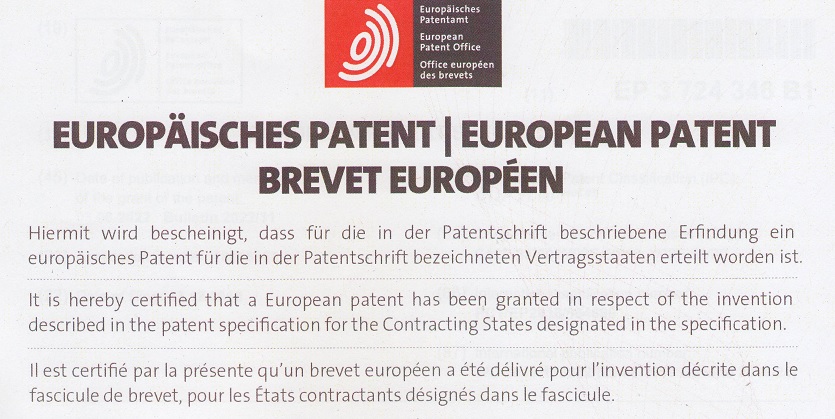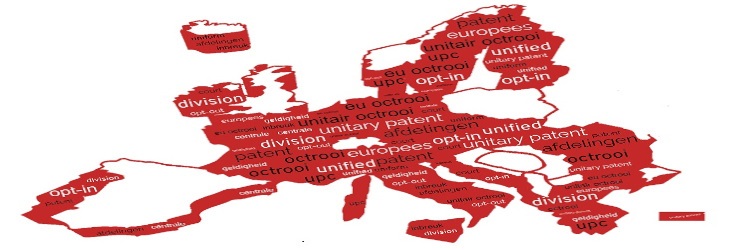Blogs
Patricia regularly writes blogs explaining various aspects of patents, inventions and entrepreneurship.
14 December 2025, |
||
 |
| A new type of European patent  Recently, a new type of European patent, the Unitary Patent, was introduced. While the present, classic, European patent focuses on patent protection in Europe, the Unitary Patent is designed for patent protection in the European Union. What are the most important changes and what does this mean for you.? • Why do we need a Unitary Patent? • Uniform European Patent system • Unitary Patent Package • How do I apply for a Unitary Patent? • From when can I apply for a Unitary Patent? • In which EU countries is a Unitary Patent valid? • Exceptions EU countries • What happens to my present (classic) European patent? • What are the costs of a Unitary Patent? • What are the advantages of a Unitary Patent? Why do we need a Unitary Patent? The Unitary Patent is a new type of European patent which should allow for easier and more affordable uniform patent protection in the European Union (EU). The Unitary Patent is also referred to as EU patent or European patent with unitary effect. It is valid in all participating countries, with less formalities than the classic European patent. The Unitary Patent is a new type of European patent, for protection in the European Union (EU).
Uniform European patent system The Unitary Patent is part of the original idea of a uniform European patent system: - one EU patent - one EU patent court - reasonable costs It has taken many years to establish the system. At least from 2013. Some may say even from as early as 1973. On 1 June 2023 the new system started! Unitary Patent Package The Unified Patent Court (UPC) is the court for Unitary Patents. The Unitary Patent together with the Unified Patent Court is also referred to as the Unitary Patent Package (UPP). They are linked. A decision of the Unified Patent Court is valid in all EU-countries. How do I apply for a Unitary Patent? Applications for a Unitary Patent should be filed with the European Patent Office (EPO), just like a classic European patent. Only just before grant you can indicate that you prefer a Unitary Patent. You cannot do this already when you file your application. Applications for a Unitary Patent should be filed with the European Patent Office (EPO), just like a classic European patent.
In contrast to the present, classic, European patent, the Unitary Patent does not fall apart into separate national patents. There is no requirement to validate and no translations are required, in the near future. From when can I apply for a Unitary Patent? No Unitary Patent without a Unified Patent Court (UPC), because as soon as a Unitary Patent is granted, it could become the subject of patent litigation. The UPC was opened on 1 June 2023. So from 1 June 2023 it is possible to have a Unitary Patent. In which EU countries is a Unitary Patent valid? The Unitary Patent will be valid in almost all countries of the European Union. Hence, the name EU patent. 
Exceptions EU countries. The Unitary Patent does not give protection in Croatia, Poland and Spain, nor in non-EU countries, such as Norway, the United Kingdom and Switzerland. Certain countries in Europe are therefore not covered by the Unitary Patent system. To get protection in Switzerland, Norway or the United Kingdom, the Unitary Patent will have to be combined with national patents or classic European patents. The UPC also covers the Caribbean part of the Kingdom of the Netherlands, with the exception of Aruba. What happens to my present (classic) European patent? Your classic European patent remains valid. For court cases about your classic European patent there are two possibilities. You, or the other party, can go to a national court or to the Unified Patent Court (UPC). If you like pioneering, go ahead and use the new system. But do not forget: A third party could ask the UPC to declare your patent invalid. If the request is successful, your patent will be invalid in all participating EU countries. Therefore, the threshold to ask for invalidity of a patent throughout the EU is lower than under the classic system. In the classic system, you have to invalidate in each individual country. If you only have a few, or even one, egg in your basket, you may be more careful and consider an opt out. An opt-out has the effect that your classic European patent is not covered by the UPC system. A decision of the UPC is valid for all participating EU countries. What are the costs of a Unitary Patent? Up to grant, the costs for a Unitary Patent are the same as for a classic European patent. After grant, the Unitary Patent does not fall apart into separate national patents, like the classic European patent. There is no requirement to validate. A translation in only one other language will be required for patent applications in English. What are the advantages of a Unitary Patent? The Unitary Patent and the Unified Patent Court have certain consequences. Whether these consequences are advantages or disadvantages depends on many things. For example, whether you are owning a patent or challenging (attacking) a patent. Other aspects are the strength of the patent, your budget in time and money, and which countries are of importance to you. Advantages for a patent owner ✔ the same familiar granting procedure as a classic European patent ✔ valid in more countries against less translation costs ✔ decision of infringement is recognised by all participating EU countries. Advantages if challenging a patent ✔ lower costs and less complexity in patent court cases ✔ declaration of invalidity or non-infringement is recognised by all participating EU countries. Attention ✔ Unitary Patents cannot (yet) be obtained for Poland or Spain ✔ Unitary Patents cannot be obtained for Norway, United Kingdom or Switzerland ✔ combination with a national patent or a classic European patent may be necessary ✔ short deadlines in procedures Further reading Unitary Patent click here Patricia Ringeling Dutch and European patent attorney Enelex Innovation B.V. Delft, 1 August 2023 Do you want to know more about Enelex Innovation B.V.? click here |
Copyright © 2025